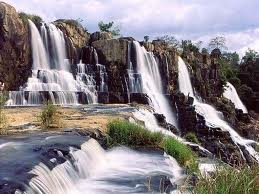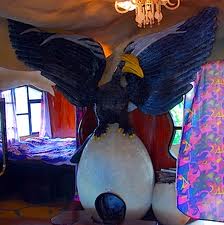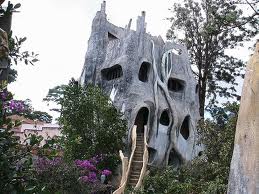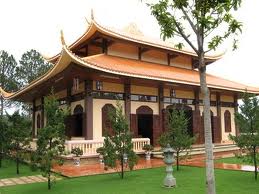
![]()
Index • |
Welcome • |
About
Us • |
21st Century • The Future |
World
Travel • Destinations |
Reviews • Books & Film |
Dreamscapes • Original Fiction |
Opinion
& Lifestyle • Politics & Living |
Film
Space • Movies in depth |
Kid's
Books • Reviews & stories |
Dreamscapes Two • More Original Fiction |
The International Writers Magazine: On Beauty, Crazy Houses, and The Fall of Empire
The Honeymoon Hunter of Dalat
• Phillip Donnelly
Dalat is thought of fondly by most Vietnamese, in no small part because this is where they usually spend their honeymoons.
I looked out for them on my own foray in the Dalat woodlands, the Honeymooner Hunter, humming Cavatina and staring moodily into the distance. They hid from my gaze, my post-nuptial prey; or perhaps I had come out of Honeymoon Season; or perhaps they are all in Hanoi, circling Hoan Kiem Lake, gaily bedight in full bridal costume, by the Lake of the Returned Sword, sweating through a lunar month of having their photographs taken in frozen poses of mutual adoration. Honeymooners take wedding albums very seriously indeed, and there is no discomfort they will not put themselves through in order to secure the perfect photos of wedded bliss.
What would I have said to them if I had found them? ‘Love will tear you apart again, in the inescapable division of joy and the great deadening that is age’. Honeymooners don’t want to hear that sort of thing, I thought, leaving Dalat on a coach bound for Saigon, listening to Joy Division to escape the untouchable conversational droppings of the motorized caste of fifty: the Dalit vernacular of the modern tourist.
I was looking for a chapter motif that never came. Life is not sandwiched neatly into packets, as I have said before, but as your guide and narrator, I must try to weave coherence into the narrative nothingness.
Why honeymoon here rather than elsewhere, you might reasonably ask? It is a good way to begin: the ‘why’ way. They come for the famed friendliness of the locals, the mercifully cool climate and the romantic scenery, And what scenery there is, here in the forests of the Central Highlands.I like the trees, you know? I like the way that the trees are on mountains, all the different... the way the trees are.
Thus spoke Deer Hunter Nick, but how might that description be embellished?
Rolling hills as far as the eye can see; dressed in trees that know no season to shed their leafy raiment; trees that never have to freeze in snowy winters or swelter in mossy jungle summers; trees that know not the infestation of creepers and all the fungi that bark is heir to. If I were a tree, the Highlands is where I would choose to live. Here there are trees without pain and and canopies of eternal green. But how quickly this elusive beast, the deer beauty, sprints away.“You have to think about one shot. One shot is what it's all about. A deer's gotta be taken with one shot.”
But no sooner have you got beauty in your sights than it disappears. How do you hunt an abstract deer that dissolves on sight? It is El Dorado, this beauty thing; a quest that can never be competed; a grail that can never be found. Beauty is brief -- ‘the perfume and suppliance of a minute’ -- and you may as well hunt ghosts.
If I were to add up all the moments in my life when I have felt myself in the presence of beauty, I do not think they would amount to a single day’s worth. If only one could squeeze them all together, all these moments of beauty, and live them near the beginning of life and dispense with the dull remainder. And if one could bottle one’s experiences of beauty and sell them to another beauty hunter, what price would they fetch? How much would a minute of beauty cost?
It would be an interesting way to evaluate life, would it not, to measure the total time one had felt oneself to be in the presence of beauty; to count the hours of rapture? Headstones of the future could read as follows:Here lies Joe Blogs
Born 1950 died 2020
Total Beauty Time 29:42Or maybe not…
Not finding much beauty in the kitsch Valley of Love, I descended into the ‘Crazy House’. It is not, as its name suggests, a house full of crazy people, or even a house that has developed a schizoid personality disorder and hears human voices in its plaster, but rather a house built in direct contravention of standard building norms; a house built not to be functional but instead to appeal to the imagination. When architects dream, I suspect, The Crazy House is what their dreams consist of.
The house was designed to resemble a giant banyan tree, but to me at least, it resembled Gaudi’s Casa Mila in Barcelona. Straight lines are replaced with curves, solids made seem molten, and everything is curvilinear, not rectilinear, like the forms of life we find in nature, like life itself. When ascending the staircases, for example, one has the feeling that one is moving up through the tubular ribs of some alien species, heading for the heart; or some other muscled cavity. The Crazy House reaches the pinnacles of surrealism in the garden, with giant concrete toadstools, ropey spiders’ webs and piped rustic bucolic animal croaks and cries. The rooms themselves also have echoes of Hansel and Gretel, or some other fairytale, with roofs that look like plastered sand dunes and furniture that appears to be melting into living forms, evolving into life.
All in all, it is not what one expects to find in communist-approved art, which generally prefers the formulaic realism of the toiling masses; depicted even now, in every town and city, on posters at all busy intersections: soviet heroes building the socialist utopia under the beneficent eye of an omnipresent Uncle Ho.
Indeed, The Crazy House, or ‘Fantasy Emporium’ to give it its proper name, has no admirers among the Dalat Commissars, and it was only with the intervention of Hanoi that the project was permitted to continue; helped in no small part, a cynic might suspect, by the fact that the artist’s father was the second President of Vietnam, Truong Chinh. One doubts if the visions of Hang Nga, or Daughter of the Moon, would have persevered otherwise.
The house is certainly a masterpiece of surrealism and it continues to be embellished today, growing larger and stranger by the day, but to be honest, it is no Casa Mila. While I did enjoy swirling through it very much, losing myself in the idea of an architecture that mirrors life rather than imprisons it, The Crazy House is, in the final analysis, a poor man’s Gaudi. For all its cleverness, it lacks that spark of genius that separates the imitation from the original.My quest for beauty continued with the source of all life: water! Mounting my trustee Yamaha steed once more, twirling ourselves through wooded roads, we witnessed another navigational miracle and found our way to Dantalla Falls, a picturesque waterfall. On stabling the steed, we descended hundreds of steps, knowing all too well that we would have to ascend them on our return. What goes down must also come up. T’is the Law of the Tourist.
We passed through a forest of sorts, shaken by the cries of excitable passengers on some sort of monorail, hurtling the mystic masses to the contemplative serenity of the waterfall at breakneck speed. I begged to wife to let me ride the contraption, but she refused.
Waterfalls always disappoint me. Perhaps it is a by-product of growing up seeing Niagara Falls on TV so often, but the image my mind carries of those mammoth falls leaves me feeling serious underwhelmed by the real thing. I always expect them to be a hundred times larger than they actually are. A waterfall on the scale of Niagara or Iguazu would indeed inspire a sense of awe and wonder, but the more mundane of falls; well, what is there to be awed by? Water tends downwards, drawn by gravity to the lowest point, and when a gap presents itself, water will fall to pass through it. It is what everything does. It falls.
Nevertheless, we are drawn to them, as a species. Waterfalls exercise the same magnetic pull as beaches; and if you find one, you can charge people money to look at it; and also try to sell them bric-a-brac as they approach it, and water to drink as they return from it. There’s money in looking at water fall. If you could make it flow upwards you could charge even more, but modern pumping stations seem blind to the commercial possibilities, not to mention sewage stations – who would not pay good money to see shit rise upwards?
Thoughts such as these travel with me, in the Great Constipation of the Mind, relieved by and released into the Diarrhea of the Text. That is why writers write, you see, because their mind is blocked and their pen is the plunger that will clear the u-bend.
But I have veered off course – there is no beauty in the lavatory. Let me instead climb up from the base of the waterfall, remount the metal horse and bring you a palace fit for a king.
If the forest and the waterfall are beauty in its natural form and The Crazy House in its surreal form, then where better than the emperor’s Summer Palace to find beauty in its more majestic form.
At first sight, the palace looks rather disappointing -- its exterior strangely reminiscent of a British Local Health Clinic from the sixties -- but once you step inside, you are transported back in time, to before the Second World War. None of the furniture has been changed and everything has been restored to just how it looked in the thirties. It’s almost as if as if the royal family if simply away on official royal business, rather than permanently defunct and as dead as the Romanovs in this Socialist Peoples Republic.
Even the floorboards are as they were; and to protect them, one had to don felt slippers, affixing them over one’s own footwear. This was the highlight of the visit for one happy pair of children, who were able to skid their way around the palace all afternoon. I was tempted to join them, I must admit, but it would not have been dignified. The décor was indeed elegant, but it was a refined, tasteful type of elegance -- charming and never vulgar. The royal cull that followed the First World War seemed to have taught the saner aristocrat that gaudy opulence was no longer acceptable to those who were paying the bills, and while there is wealth in this palace, there is little ostentation. It is the mansion that an enlightened industrialist might build, not the palace of a demonic despot. Or perhaps that was just it what it wanted to appear to be. Perhaps, in this palace, as in so much else, Bao Dai was merely aping the French.
It is a curious biography, this life of Bao Dai, the ill-fated ‘Keeper of Greatness’ and the thirteenth and last Nguyen emperor. His people might have forgiven him for being a puppet of the French Imperialists, since to have been otherwise would surely have led to his being deposed and replaced by a more pliant ruler. They might also have forgiven him for his dissolute playboy lifestyle, for his opportunism, for being so largely absent from Vietnam and so lacking in a sense of Vietnamese nationalism; but when he was also, however briefly, a puppet of the Japanese, he was convinced by Ho Chi Minh that this would never be forgiven.
He abdicated in Hue, handing over power to Ho and the Viet Minh, not to the French, and in return was given the pointless position of Supreme Councilor, but tiring of the role, he soon went into sumptuous exile in Hong Kong and the French Riviera.
He changed his mind once more and was for a time the titular head of South Vietnam, but was deposed by President Diem in 1954, in a ridiculously corrupt and flawed election in which Diem won 98% of the vote. Bao Dai left Vietnam for the last time and continued his life of luxury abroad and was even buried there, in Paris, in 1997.
Walking through his Summer Palace, with his image in portrait staring down at me, I imagined Bao Dai’s lifestyle, so at odds with the art deco furnishings: the five wives and the concubines, the imperial residences and palaces, the hunting parties, the Rolex and the Mercedes, and so on and so forth. This was not a man imbued with the spirit of the age.
Or was his life the embodiment of some form of a sensual stoicism or a perverted Taoism? Was he a disciple of Wu Wei, or action without action, yielding like the water to any external force, bending like a tree and adapting to the currents of the time, obeying this lord on one day and calling another master the next. Or as the Mandarin proverb puts it:“The tree that does not bend with the wind will be broken by the wind”
Bao Dai followed the precepts of the proverb, accepting the French one day, the Japanese the next, Ho Chi Minh after that, and finally even the Americans, but in the end, he was still broken, and left to contemplate the fickleness of fate from his Parisian exile.
It is easy to condemn Bao Dai for opportunism and an apparent lack of political conviction, but in truth, our own lives have much in common with the regent. We are all tottering monarchs in this republican age – just indentured indebted ones. We trade one boss for another, blowing this way and that, adapting our opinions to fit our audience, bending with the wind lest we be snapped and severed from the source of our financial nutrients -- the soil of employment.
Who would be deposed into the sweaty ranks of the unemployed? We cannot abdicate our financial responsibilities, unless we choose to become homeless and play the difficult role of the street bum -- the road less travelled. We cannot even choose exile, since this too costs money; and so we must wait upon the final exile, the one from which no traveller returns.And so, what is life in the final analysis, in the final page? It is a quest for beauty, yes, but ‘quest’ is too grand a word, conjuring up as it does images of knights and chivalry and the epic heroism of Homer. Modern man, the office drone, the slave of the screen -- for him there are no quests. Peasants may not hunt the Holy Grail. Modern man is, and must be, a wee timorous beastie, furtively scurrying for the scraps of beauty that fall under the floorboards, sniffing out the crumbs that fall from the giants’ tables.
In this shrinking world there is less and less beauty to grab. The game from the forests of Dalat is long since dead and gone; as are the Lat tribe after whom Dalat was named; as are the hunting elite who originally settled Dalat; as are their dreams of building a Hill Station and a ‘Petite Paris’. There are no deer hunters, no emperors, no colonists. Even the forests are shadows of their former selves, cropped higher and higher into the mountain peaks, disappearing into themselves, as this chapter ends, in and of itself, descending into crumpled visions…And in the future; when there is nothing left, I will return to climb a peak. And from a lofty vantage point, 2000 metres high, I will survey the blasted earth; and with a whine will I profess the bleakest of Blake.
There are no tigers burning bright in the forests of the night, and no immortal hand or eye dare frame their fearful symmetry.
When man has come and man has left and all the beauty gone, I alone will pose to ghosts the eeriest of songs: Did He who made the lamb make thee?
And yet this weary traveller, on a numbered seat in a matriculated vehicle, had taken some moments of beauty in Dalat: in the trees, in the lakes; in the hills, in the valleys; in the palaces of the king, in the house of the artist. He would store these memories and add them to his pot of gold; pouring them into the beauty within, taken from without.
© Phillip Donnelly Feb 2011More Travel





